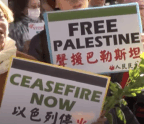International Women's Day in Mexico City: A demonstration shrouded in sorrow

Originally published on Global Voices

Placards from this year's International Women's Day march in Mexico City. Photo by Gabriela Mesones Rojo, used with her permission.
March 8 is undoubtedly one of the key dates for feminist movements throughout the world. The significance of this date stems partly from a deeply tragic event, the Triangle Shirtwaist Factory fire in New York in 1911, which claimed the lives of 146 workers. Most of these were immigrant women who had campaigned for improved working conditions which would enable them to combine their jobs with looking after their families, as well as for better pay and fairer treatment in the workplace. The factory owners had locked the emergency exits and many of the women were forced to jump from windows to escape the fire. However, this event has come to symbolise other struggles, many of which are connected to socialist movements worldwide and which are centred on equality for women regardless of their country of origin, religion, race, ethnicity, or marital status.

A woman in traditional Aztec dress at this year's International Women's Day march in Mexico City. Photo by Gabriela Mesones Rojo, used with her permission.
In Mexico, many women lead precarious lives in the shadow of violence. More than 16,000 women have been killed in Mexico since 2012, yet fewer than a fifth of these cases have been investigated and tried as femicide — defined as a violent killing with a gender-related motivation. This is despite the introduction of legislation in 2015 under which killings arising from gender-related violence are to be considered cases of femicide.

Women resting during the March 8, 2023 march in Mexico City. Photo by Gabriela Mesones Rojo, used with her permission.
Another manifestation of extreme violence which looms over the lives of Mexican women is that of unexplained disappearances. More than 110,000 people have been reported missing throughout the country, many of these cases being related to an ill-judged and bloody war on drugs. Women, however, account for 28,000 of these disappearances, in other words almost a quarter of the total.

Poster of a missing woman seen at this year's International Women's Day march in Mexico City. Photo by Gabriela Mesones Rojo, used with her permission.
“My sister would be 21 if she were still alive,” “If I disappear, look after my mother,” “I'm a teacher — don't touch my girls,” “UNAM (Universidad Nacional Autónoma de México, one of the country's best-known universities) is a safe haven for rapists …” — these were just some of the placards at the Women's Day demonstration that spoke to feelings of great sorrow, as well as to the failure of successive Mexican governments to protect many of their female citizens who have been either directly or indirectly affected by different types of violence, and in many cases extreme violence.

A poster with a photo of a man accused of rape, seen at this year's International Women's Day march in Mexico City. Photo by Gabriela Mesones Rojo, used with her permission.
The Women's Day demonstration, or 8M as it is also known, brings Mexican women together in a collective sense of pain and anger, and although in many countries it provides the opportunity for women to celebrate their bodies, their voices, their experiences, and their needs, in Mexico City there is a palpable sense of anguish arising from the experience of being a woman in Mexico.

Women protesting during this year's International Women's Day march in Mexico City. Photo by Gabriela Mesones Rojo, used with her permission.
In Santiago, the capital of Chile, which is the setting for one of the biggest demonstrations in the Americas, Women's Day is marked by countless stories of sexual abuse and harassment. At the same time, however, it is also a celebration of the country's many women's groups and movements, among whose many achievements was the “women's vote” which helped overthrow Augusto Pinochet, one of the most brutal dictators in the history of Latin America. In Madrid, Women's Day is a celebration of the achievements of the past: free, unrestricted, and universal access to safe abortions, progress in gender equality in the workplace, and the role of women in the world of politics.

Women protesters watched by police during this year's International Women's Day march in Mexico City. Photo by Gabriela Mesones Rojo, used with her permission.
In Venezuela, Women's Day is not a mass event, but rather a small gathering of women who are forced to confront not only the police and paramilitaries but also the taunts of their fellow Venezuelans in an attempt to raise awareness of the humanitarian crisis in women and LGBTQ+ communities, the complete lack of official data and protection on the part of the government, and the increase in the number of femicide cases which are not investigated thanks to irregularities in the justice system and officials who have not been trained to deal with gender violence.

A woman posing in traditional Aztec dress during this year's International Women's Day march in Mexico City. Photo by Gabriela Mesones Rojo, used with her permission.
In Mexico City, Women's Day is an externalisation of the despair felt by Mexican women because they are women: the abuses that LGBTQ+ communities are subjected to because they do not fully comply with binary and biology-based concepts of gender; the sense of horror which gives rise to the creation and support of communities in a context of femicides, disappearances, a marked increase in domestic violence, systematic injustice in the workplace, feelings of abandonment in relation to caring for and protecting our families, and restricted access to health care and the legal system.

A child with a placard during this year's International Women's Day march in Mexico City. Photo by Gabriela Mesones Rojo, used with her permission.
International Women's Day is not a cause for celebration anywhere in the world; yet in few places do women express their pain as they do in Mexico, in all their diversity, in all their charm, with all they have achieved, and all the sorrow they have felt. “No more violence, no more mistreatment, no more humiliation,” they sang at the end of the afternoon in the Zócalo, the main square in the heart of Mexico City, while teargas was used to pacify the crowd. The women of Mexico are a long way from being pacified, however; having lost so much, they have also lost their fear.

Women protesters watched by police during this year's International Women's Day march in Mexico City. Photo by Gabriela Mesones Rojo, used with her permission.
Originally published in Global Voices.






